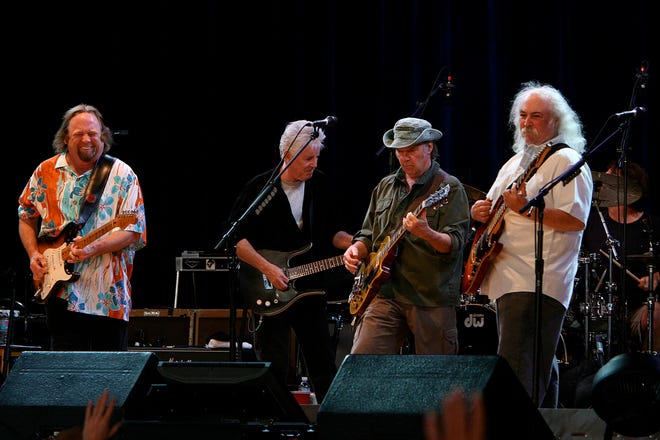Another pair of musicians wants their music removed from Spotify following Neil Young’s protest over the streaming service having podcast host Joe Rogan on the platform.
Last week, Young condemned Spotify for having “The Joe Rogan Experience” podcast on the service in a letter, since removed from online: “Spotify is spreading fake information about vaccines – potentially causing death to those who believe the disinformation being spread by them.”
“I want you to let Spotify know immediately TODAY that I want all my music off their platform,” Young said. “They can have (Joe) Rogan or Young. They cannot have both.”
Nash, who has recorded and performed with Young in Crosby, Stills, Nash & Young (along with David Crosby and Stephen Stills), echoed his one-time bandmate in a statement released Tuesday.
“Having heard the Covid disinformation spread by Joe Rogan on Spotify, I completely agree with and support my friend, Neil Young and I am requesting that my solo recordings be removed from the service,” he said in a statement.
More:Spotify to add advisories to podcasts discussing COVID information amid protests
Adele sets a date:Adele confirms Brit Awards performance, her first since postponing entire Vegas residency
R&B singer India Arie made her intentions known on Instagram: “I have decided to pull my music and podcast from Spotify. Neil Young opened a door that I MUST walk through. I believe in freedom of speech. However, I find Joe Rogan problematic for reasons OTHER than his Covid interviews… FOR ME ITS ALSO HIS language around race.”
Rogan’s podcast library was acquired by Spotify in 2020 in a deal reportedly worth more than $100 million, according toThe Wall Street Journal.
Rogan, who tested positive for COVID-19 in September, has been critical of safety measures against the viruson his podcast and had downplayed the need for mass vaccines for large events like comedy shows.
Following Young’s protest, Spotify chief executive Daniel Ek on Sunday disclosed that the music streaming service would add content advisories before podcasts discussing the virus.
“Personally, there are plenty of individuals and views on Spotify that I disagree with strongly,” Ek wrote. “It is important to me that we don’t take on the position of being content censor while also making sure that there are rules in place and consequences for those who violate them.”
Since Young’s announcement, Joni Mitchell and Nils Lofgren have also asked that their music be removed from Spotify.
SPOTIFY – TICKINGHere are 8 things you didn’t know about the service
BYE-BYE, SPOTIFY:How to delete your Spotify account, and where to go next to stream music
India Arie, Graham Nash on Spotify
Arie’s albums currently on Spotify include Grammy-inning album “Voyage to India,” which includes “Little Things,” which also won a Grammy in 2002 for Best Urban/Alternative Performance. Also on Spotify: “Pearls,” a song that won the Best Urban/Alternative Performance Grammy on the nominated 2009 album “Testimony: Vol. 2, Love & Politics.”
Currently, Spotify has six albums from Nash including “Reflections,” a 64-track collection including songs from Crosby, Stills, Nash & Young, as well as the trio Crosby, Stills & Nash and recordings by Nash and Crosby.

Not all artists can easily have their music removed, usually because of licensing and label relationships.
For instance, David Crosby has told the Los Angeles Times he agrees with his CSNY bandmate Young, but he doesn’t own his own music and publishing rights. “I can’t just call up and say, ‘Hey, I want to do what Neil did,’” Crosby told the Times. “I can’t do it. But I can call them up and say, ‘I wish you would do it.’ Which is what I’m going to do. …They (Spotify) are consciously doing the wrong thing for money on purpose. That’s unforgivable.”
Nash cited a letter signed by about 270 doctors, physicians and science educators calling on Spotify to stop spreading Rogan’s commentary and “moderate misinformation on its platform.”
“There is a difference between being open to varying viewpoints on a matter and knowingly spreading false information … Likewise, there is a difference between misinformation, in which one is unaware that what is being said is false, versus disinformation which is knowingly false and intended to mislead and sway public opinion,” Nash said. “The opinions publicized by Rogan are so dishonest and unsupported by solid facts that Spotify becomes an enabler in a way that costs people their lives.”
Follow Mike Snider on Twitter:@mikesnider.

